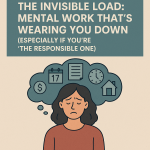“When Helping Hurts: The Hidden Trap of Codependency”
In many South African families and relationships, being caring and supportive is celebrated—but sometimes, that support crosses a line. You may find yourself constantly rescuing others, fixing their messes, or sacrificing your own needs. That’s not always love. It might be codependency.
💡 What Is Codependency?
Codependency happens when your sense of self-worth becomes tied to how much you do for others—especially when helping comes at your own expense.
It often looks like:
Trying to save or fix people, even when they don’t ask
Ignoring your own needs because you’re too focused on someone else’s
Feeling guilty or anxious when you set boundaries
Staying in toxic relationships because you’re afraid of being “selfish”
🚩 Signs You Might Be Stuck in the Trap
You feel responsible for other people’s happiness, decisions, or consequences.
You put your partner’s or family’s needs ahead of your own—even when it hurts you.
You struggle to say “no” without guilt.
You feel angry, drained, or resentful after constantly giving.
You fear being abandoned or rejected if you stop “being there” for them.
🧠 Where It Often Starts
In many homes, especially in cultures where emotional needs were rarely spoken about, children learn to become emotional caretakers:
A child becomes the “adult” because a parent was emotionally absent, struggling with addiction, or overwhelmed.
You were praised for being “good,” “helpful,” or “strong”—so you learned to suppress your own needs.
🔍 Why It’s Common in South Africa
In South Africa, generational trauma, poverty, and broken family structures have shaped the need to “hold everyone together”. Cultural values around loyalty, family honour, and survival often make people feel trapped in unhealthy helping roles.
💥 The Hidden Cost
Constantly giving without receiving eventually leads to:
Burnout
Anxiety
Anger or emotional numbness
Loss of identity (“Who am I if I’m not fixing everyone else?”)
🌱 What Healing Looks Like
✅ Start with boundaries – Saying “no” is an act of self-respect, not betrayal.
✅ Recognise your worth – You don’t have to earn love by over-functioning.
✅ Let others be responsible for themselves – Support doesn’t mean saving.
✅ Consider therapy – Codependency often masks deeper wounds that need gentle unpacking.
💬 Final Thought
You can be loving, generous, and supportive—without losing yourself in the process.
Helping isn’t supposed to hurt you.
💛 This post is for reflection only and not a substitute for therapy. If it hits close to home, talking to a professional can help you set boundaries and heal the need to overgive.




